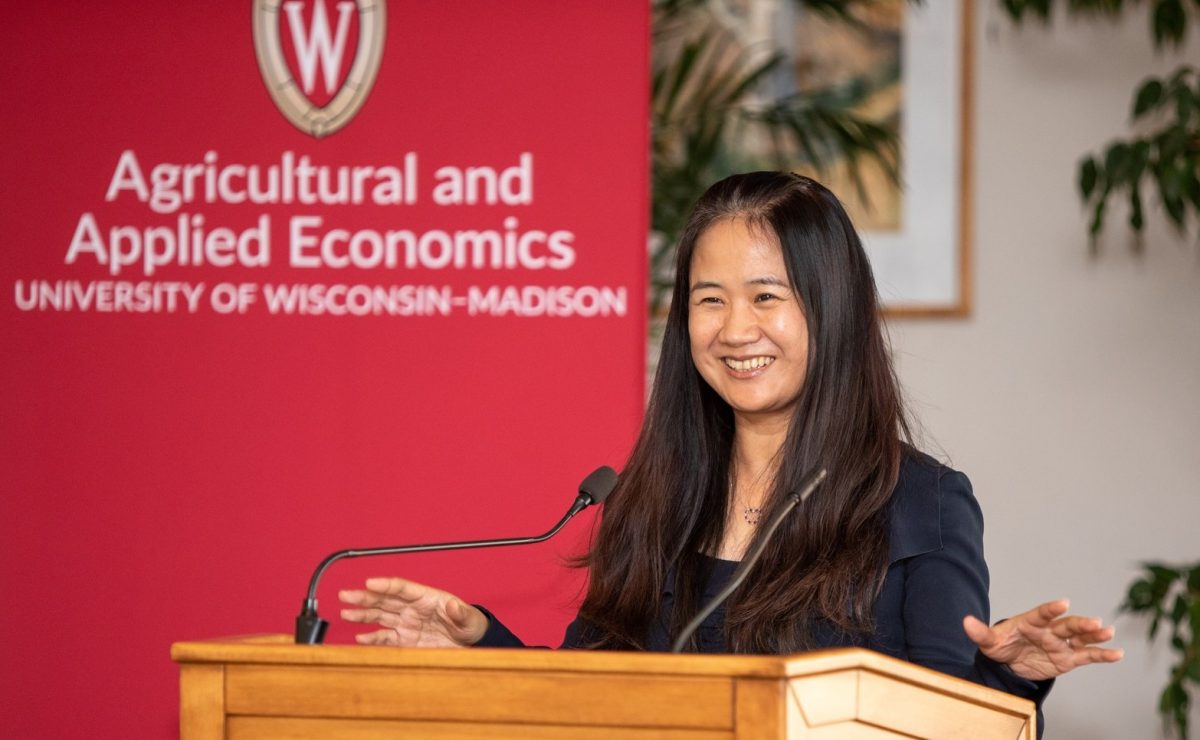
Greetings from UW Madison (UW) and the Department of Agricultural and Applied Economics (AAE). The beginning of the new academic year has also ushered in the beginning of a new chair. Before I introduce myself further down the page, I want to thank my colleague and predecessor, Professor Guanming Shi. She was exactly the right chair at a time when we needed her. Her leadership, warmth and entrepreneurial drive are evident in our growing engagement with alumni, donors and industry, whether through the establishment of global alumni hubs, new professional programs or furthering the growth of experiential learning opportunities. Thank you, Guanming.
As I step into this new role, I’ve been reflecting on the path that led me to AAE—one that started far from UW, but somehow always seemed to circle back here. I grew up on a farm in Iowa, as close to La Crosse, Wisconsin, as one can get without leaving Iowa—right in the northeastern corner of the state; we could see Wisconsin and Minnesota from our farm. As an undergraduate at Iowa State University, I studied ancient history as a way to “wash the farm” off me. There, I met and married my wife and then moved to Madison to pursue a PhD in Classics. I was a teaching assistant for three years, including for Classical Mythology, which was taught in the large classroom in Ag Hall. Little did I know I’d be working in Ag Hall one day! The arrival of our firstborn, combined with a dearth of job opportunities in the humanities, necessitated a practical decision to change academic paths to economics. I returned to Iowa State for my PhD and then was hired as an assistant professor at Texas A&M University in Agricultural Economics, where AAE alumnus Rich Woodward, PhD ’77, encouraged me to consider a position at UW.
I have been in AAE since the fall of 2004, when I was hired as an assistant professor in production economics with extension responsibilities in farm management. I have an active research and outreach program very much focused on agriculture, and I bring that history and network to the chair’s office. For several years I was the director of the Renk Agribusiness Institute, which hosts the annual Wisconsin Agricultural Outlook Forum and supports the Renk Scholars, recipients of Renk Scholarships, awarded to outstanding undergraduates interested in careers in agriculture or agribusiness. In 2023 I spent a year as interim associate dean for academic affairs and learned a lot about how the college runs, knowledge that will help us thrive as a department.
In addition to teaching and research, I serve on the board of the Wisconsin Agricultural and Life Sciences Alumni Association (WALSAA), along with my now tenured colleague Professor Andrew Stevens, where I have met many wonderful CALS alums, including many from AAE. I am also the advisor for the Collegiate Farm Bureau student chapter on campus, a fun student club with many of our majors as members. I co-direct the Wisconsin Rural Partnerships Institute, which conducts research to help rural areas of the state address their issues and problems, a perfect example of the Wisconsin Idea in action. I could go on; the point I want to make is that I help put the A in Agricultural and Applied Economics. But I know that agriculture is only the beginning of AAE – our current department is so much broader – encompassing environmental and natural resource economics, international development, community economics, along with a variety of related issues.
Funny how life works—what started as a practical shift ended up guiding me back to a place that is now home. In these twenty years, my wife Jennifer and I have both been active members of the UW community; she worked at the UW Arboretum for several years and she also worked at the Child Development Lab’s pre-school. Our two children both graduated from UW, although neither of them from CALS. Currently our daughter lives in Phoenix, and our son is in Los Angeles. We see them as often as we can.
If you’ve read this far, you can see that my path to AAE has been anything but traditional, however, it is one that has prepared me well for the challenges ahead. We are living in a time of transition. I believe future historians may look back at this time as a turning point—when higher education began to redefine its role in society. Land-grant universities like UW are well-positioned to lead this shift, and I see CALS and AAE playing a central role in reconnecting academic work with the needs of our communities.
As one of the world’s leading public universities, UW is deeply shaped by the Wisconsin Idea and our land-grant mission. I believe institutions like ours have a responsibility to address real-world challenges—and to ensure our work remains relevant and accessible to the broader public. I’m honored to serve as chair of AAE during a time of renewed focus on engagement and impact. This effort will influence our research, teaching, and outreach in meaningful ways. I’m grateful for the dedicated faculty and staff I work alongside, the students who continue to choose AAE, and the alumni and partners who inspire us to keep improving. Expect to hear more about what we are doing in AAE and as always, please share your news with us.
On Wisconsin!
![]()
Dr. Paul D. Mitchell
Professor and Chair, Agricultural and Applied Economics
Extension Funded Faculty in Cropping Systems Management
Co-Director of the Wisconsin Rural Partnerships Institute
